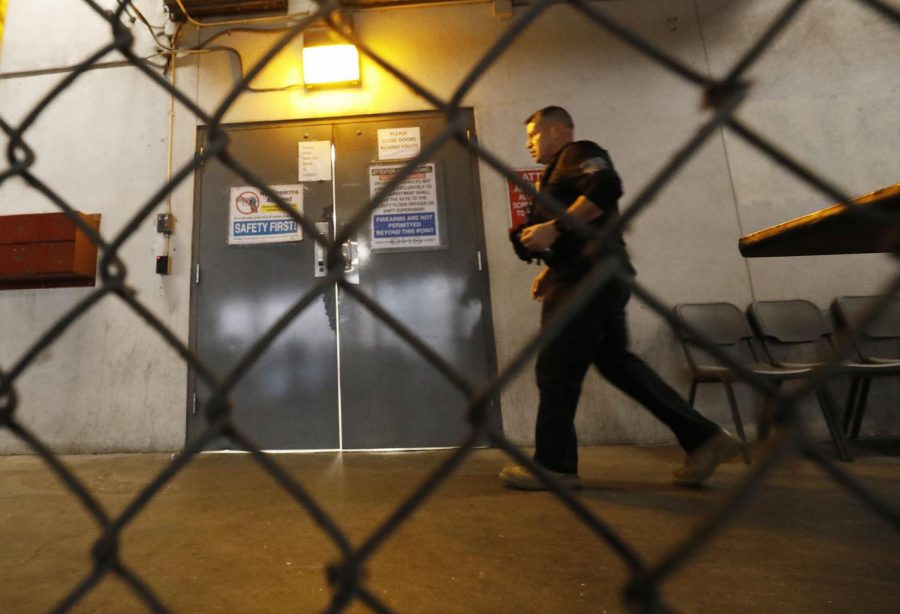Organizations fight to release immigrants facing COVID-19 risks in detention centers
David A. Marin, a director of enforcement and removal operations with Immigration and Customs, in Bell Gardens, Calif., on March 16, 2020. Illinois civil rights organizations have pushed Immigration and Customs Enforcement to release detainees at risk for complications from COVID-19.
May 27, 2020
As crowded conditions and personal protective equipment shortages threaten immigrants held in detention centers, Illinois legal groups and local advocates are pressing for their release.
Over 1,300 detainees in Immigration and Customs Enforcement custody have tested positive for COVID-19 — including 29 at the Pulaski County Detention Center in Illinois. As of Sunday, two immigrant detainees in ICE custody have died of COVID-19, the agency reported. The Columbus Free Press also reported a third death from COVID-19 in mid-May that ICE has not yet corroborated.
Juan Caballero, an American Civil Liberties Union of Illinois attorney, said it’s impossible to observe social distancing in tightly-packed detention centers. Caballero said clients frequently report limited PPE access in detention centers across the state.
“One of our clients … described it as sort of a nightmare,” Caballero said. “People are in small confined spaces where they just can’t escape the virus, and in turn what happens is these detention centers become vectors of the disease.”
Illinois has three active immigration detention centers: the McHenry County Adult Correctional Facility, the Pulaski County Detention Center and the Jerome Combs Detention Center.
The ACLU of Illinois and the National Immigrant Justice Center have both filed litigation to release individuals at risk for complications from COVID-19 from detention centers.
As of May 13, two of the ACLU’s clients in the McHenry facility were released on the grounds that the center’s conditions put them at severe risk for dying from COVID-19. The NIJC has also successfully petitioned for three migrants’ release from the Jerome Combs Detention Center.
However, Illinois district courts denied petitions to release other detainees in both the McHenry and Pulaski centers. According to a NIJC press release, the individual at McHenry has asthma and post traumatic stress disorder, as well as vision and hearing impairments. The detainee at Pulaski has respiratory symptoms and is currently in solitary confinement, the release said.
Advocacy groups are also pressuring Heartland Alliance, an organization housing unaccompanied undocumented minors in Chicago, to release children in its facilities.
In an April statement, the organization said 42 children at Heartland had tested positive for COVID-19 through its attempts to test everyone in its facilities.
“You cannot compare our shelters, where we fought to test ALL of our kids and staff, to other shelters that have only tested those showing symptoms,” the statement said. “The facts are simple – by testing 100 percent of the population in a group setting, a higher number will be reported.”
However, Rozalinda Borcila, an organizer with the Little Village Solidarity Network, said she suspects the number of positive cases in Heartland facilities is higher than the organization reports.
Borcila said LVSN has held demonstrations outside Heartland’s Bronzeville facility every week for months. LVSN reported three of its activists were arrested after an April demonstration. Chicago Police Department records confirm two arrests in the Bronzeville area around the facility’s address.
Borcila said these migrant children face “imminent risk of death” because they’re not receiving medical attention and have limited access to healthcare.
“They have a disease that spreads like wildfire, and they’re locked up in a cage, without medical care,” Borcila said. “They’re indefinitely detained there.”
Caballero said while some detainees are experiencing temporary relief during the pandemic, future legal proceedings related to immigration remain unpredictable.
He said a temporary release from detention centers will not affect an individual’s chance of being deported in the future. Despite this, Caballero said the ACLU is still fighting to release detainees.
“There’s just no reasonable level of care that the jail can impose,” Caballero said. “We need to release this subset group in order for them to be able to protect themselves.”
Email: delaneynelson2023@u.northwestern.edu
Twitter: @delaneygnelson



